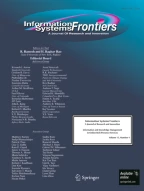Abstract
Automatic matching of job offers and job candidates is a major problem for a number of organizations and job applicants that if it were successfully addressed could have a positive impact in many countries around the world. In this context, it is widely accepted that semi-automatic matching algorithms between job and candidate profiles would provide a vital technology for making the recruitment processes faster, more accurate and transparent. In this work, we present our research towards achieving a realistic matching approach for satisfactorily addressing this challenge. This novel approach relies on a matching learning solution aiming to learn from past solved cases in order to accurately predict the results in new situations. An empirical study shows us that our approach is able to beat solutions with no learning capabilities by a wide margin.
Similar content being viewed by others
References
Cali, A., Calvanese, D., Colucci, S., Di Noia, T., Donini, F.M. (2004). A logic-based approach for matching user profiles. Proceedings of KES, 187–195.
Colucci, S., Di Noia, T., Di Sciascio, E., Donini, F.M., Mongiello, M., Mottola, M. (2003). A formal approach to ontology-based semantic match of skills descriptions. Journal of UCS, 9(12), 1437–1454.
Deza, M.M., & Deza, E. (2013). Encyclopedia of distances. Springer.
Faliagka, E., Tsakalidis, A.K., Tzimas, G. (2012). An integrated e-recruitment system for automated personality mining and applicant ranking. Internet Research, 22(5), 551–568.
Faliagka, E., Iliadis, L.S., Karydis, I., Rigou, M., Sioutas, S., Tsakalidis, A.K., Tzimas, G. (2014). On-line consistent ranking on e-recruitment: seeking the truth behind a well-formed CV. Artificial Intelligence Review, 42(3), 515–528.
Farber, F., Weitzel, T., Keim, T. (2003). An automated recommendation approach to selection in personnel recruitment. Proceedings of AMCIS, 302.
Garcia Sanchez, F., Martinez-Bejar, R., Contreras, L., Fernandez-Breis, J.T., Castellanos Nieves, D. (2006). An ontology-based intelligent system for recruitment. Expert Systems with Applications, 31(2), 248–263.
Hauff, C., & Gousios, G. (2015). Matching GitHub developer profiles to job advertisements. MSR, 362–366.
Kessler, R., Béchet, N., Roche, M., Torres-Moreno, J.M., El-Bèze, M. (2012). A hybrid approach to managing job offers and candidates. Information Processing and Management, 48(6), 1124–1135.
Malherbe, E., Cataldi, M., Ballatore, A. (2015). Bringing order to the job market: efficient job offer categorization in e-recruitment. Proceedings of SIGIR, 1101–1104.
Malinowski, J., Keim, T., Wendt, O., Weitzel, T. (2006). Matching people and jobs: a bilateral recommendation approach. In Proc of HICSS.
Martinez-Gil, J. (2014). An overview of knowledge management techniques for e-recruitment, JIKM, 13(2).
Martinez-Gil, J., & Aldana-Montes, J.F. (2013). Semantic similarity measurement using historical google search patterns. Information Systems Frontiers, 15(3), 399–410.
Martinez-Gil, J., Paoletti, A.L., Schewe, K.D. (2016). A smart approach for matching, learning and querying information from the human resources domain. In Proceedings ADBIS (short papers and workshops), 157–167.
Mirizzi, R., Di Noia, T., Di Sciascio, E., Trizio, M. (2009). A semantic web enabled system for resume composition and publication. Proceedings of ICSC, 583–588.
Lv, U., & Zhai, C. (2012). A log-logistic model-based interpretation of TF normalization of BM25. Proceedings of ECIR, 244–255.
Mochol, M., Wache, H., Nixon, L.J.B. (2007). Improving the accuracy of job search with semantic techniques. Proceedings of BIS, 301–313.
Racz, G., Sali, A., Schewe, K.-D. (2016). Semantic matching strategies for job recruitment: a comparison of new and known approaches. Proceedings of FoIKS, 149–168.
Paoletti, A.L., Martinez-Gil, J., Schewe, K.D. (2015). Extending knowledge-based profile matching in the human resources domain. Proceedings of DEXA (2), 21–35.
Paoletti, A.L., Martinez-Gil, J., Schewe, K.D. (2016). Top-k matching queries for filter-based profile matching in knowledge bases. Proceedings of DEXA (2), 295–302.
Suerdem, A., & Oztaysi, B. (2014). Collaborative requirement prioritization for an e-recruitment platform for qualified but disadvantaged individuals. Proceedings of KICSS, 547–556.
Tinelli, E., Cascone, A., Ruta, M., Di Noia, T., Di Sciascio, E., Donini, F.M. (2009). I.M.P.A.K.T.: an innovative semantic-based skill management system exploiting standard SQL. Proceedings of ICEIS (2), 224–229.
Tinelli, E., Colucci, S., Donini, F.M., Di Sciascio, E., Giannini, S. (2017). Embedding semantics in human resources management automation via SQL. Applied Intelligence, 46(4), 952–982.
Yi, X., Allan, J., Croft, W.B. (2007). Matching resumes and jobs based on relevance models. SIGIR, 809–810.
Acknowledgments
The authors would like to thank the anonymous reviewers for their helpful and constructive comments that greatly contributed to improve this work. The research reported in this paper was partially supported by the Austrian Research Promotion Agency with the Bridge Project “Accurate and Efficient Profile Matching in Knowledge Bases” (ACEPROM) under contract [FFG: 841284]. The research reported in this paper has been partially supported by the Austrian Ministry for Transport, Innovation and Technology, the Federal Ministry of Science, Research and Economy, and the Province of Upper Austria in the frame of the COMET center SCCH [FFG: 844597].
Author information
Authors and Affiliations
Corresponding author
Additional information
Publisher’s Note
Springer Nature remains neutral with regard to jurisdictional claims in published maps and institutional affiliations.
Rights and permissions
About this article
Cite this article
Martinez-Gil, J., Paoletti, A.L. & Pichler, M. A Novel Approach for Learning How to Automatically Match Job Offers and Candidate Profiles. Inf Syst Front 22, 1265–1274 (2020). https://doi.org/10.1007/s10796-019-09929-7
Published:
Issue Date:
DOI: https://doi.org/10.1007/s10796-019-09929-7
